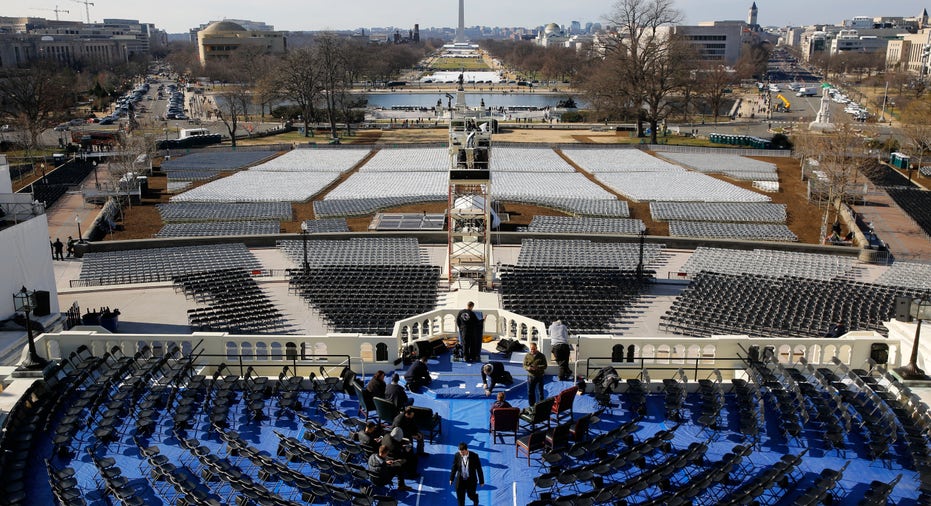As Silicon Valley Braces for Trump Inauguration, It's Not What You'd Think

Time bestows one distinct advantage on the aged: A long memory. Thinking way back to the Ronald Regan era, I recall the pervasive political sentiment in the tech industry being something along the lines of don’t bother us, we’re busy innovating.
I don’t know if you’d call it apolitical, libertarian or naïve, but all we really cared about at the time was making and selling great products.
Besides, we had bigger fish to fry. The only big brother we were worried about was a corporate behemoth like IBM (NYSE:IBM), Microsoft (NASDAQ:MSFT) or Intel (NASDAQ:INTC) coming along and squashing us like bugs. And the behemoths didn’t worry about much of anything, except maybe staying behemoths.
You might say things are a little different today. Silicon Valley couldn’t be more politically active. You don’t have to be an insider to know that, if the Bay Area leaned any further left, it would fall into the Pacific Ocean. Somewhere along the line, things changed. Or did they?
Beneath a surprisingly thin skin of progressive social ideology, when it comes to business, tech leaders are far more pragmatic than they seem.
During the run-up to the 2016 election, the #NeverTrump peer pressure was downright oppressive. Nobody would dare whisper the name Donald Trump in public, for fear of losing their job, their friends, their standing in society. Venture capitalist Peter Thiel was publicly eviscerated for supporting the GOP nominee.
More than 330 companies gave their employees Election Day off to vote. The underlying meme of the supposedly nonpartisan campaign was to stop Trump from getting in the White House. And after the upset of the millennium, there were dozens of public meltdowns and tweet bombs among the tech elite.
Correction: Some of the tech elite, but not most. And certainly not those who matter.
Amazon (NASDAQ:AMZN) chief Jeff Bezos, who traded barbs with Trump before the election, tweeted, “I for one give him my most open mind and wish him great success in his service to the country.” And when top execs from Apple, Alphabet, Microsoft, Amazon and Facebook later met at Trump Tower, Bezos said, “I’m super excited about the possibility that this could be the innovations administration.”
You would think that Silicon Valley is bracing for a post-inauguration day Armageddon. Not only does that not appear to be the case, I’m sensing more optimism, a sort of nervous energy, than I’ve felt in a very long time. Everyone I’ve spoken to has already moved on. It’s back to business, and business is booming.
If that seems hard to fathom, let me explain something. Tech entrepreneurs are optimists. They’re born problem solvers. And when they come up against tough problems with lots of variables and nuances, their instincts are to get down to business and solve them. That’s what they do for a living. And that mindset has made our industry a global force of nature.
Besides, tech giants like Google (NASDAQ:GOOGL) and Microsoft don’t just push the innovation envelope. They’ve been known to push a few ethical envelopes, as well. Google’s motto may have once been “Don’t be evil,” but when it comes to privacy concerns, Google probably knows more about us – where we go, what we buy and what we’re looking for – than the NSA, the CIA and every other intelligence agency combined.
It’s no coincidence that Brad Smith, Microsoft’s president and chief legal officer, joined CEO Satya Nadella at Trump Tower last month. Don’t forget that Smith was general counsel during the Justice Department’s devastating antitrust suit against the software giant, a case that had chairman Bill Gates squirming on the stand. And yes, Gates has also met with Trump since the election.
And don’t forget how Facebook handled allegations of bias against conservative media in its trending news feed a few months back. CEO Mark Zuckerberg and COO Sheryl Sandberg wasted no time meeting with 17 conservatives and took immediate action to remedy the problem.
Don’t get me wrong. Trump’s rhetoric, particularly around immigration and trade policy, has definitely raised concerns among the titans of tech. But the cornerstones of Trumponomics – lower taxes, fewer regulations and better trade deals – promise to benefit tech giants and startups alike. It’s a mixed bag, as it’s always been.
Make no mistake. Beneath the progressive social rhetoric, when it comes to the business of innovation, the tech industry is far less idealistic than you’d think.



















